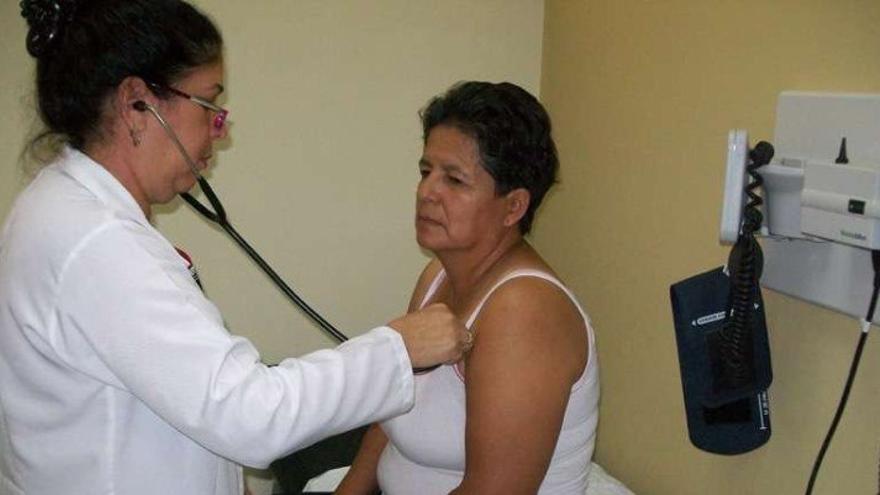
![]() 14ymedio, Mario J. Pentón, Miami, 29 September 2018 — Bernardo Sandoval Córdova, a surgeon who is dean of the Faculty of Medicine of the International University of Ecuador, has raised the controversy over the permanence of the Cuban medical mission in that South American country.
14ymedio, Mario J. Pentón, Miami, 29 September 2018 — Bernardo Sandoval Córdova, a surgeon who is dean of the Faculty of Medicine of the International University of Ecuador, has raised the controversy over the permanence of the Cuban medical mission in that South American country.
In an opinion column published in the official government newspaper El Telégrafo, Sandoval Córdova denied that Cuban doctors are needed in Ecuador and described as “inconceivable” that a government that called itself a defender of labor rights “has exploited Cuban doctors, who are given a tiny fraction of their salary*.”
Sandoval Córdova’s statements provoked a reaction from the Cuban ambassador in Quito, Rafael Dausá, and from hundreds of Cubans and Ecuadorians on social networks. Dausá published a statement describing the article in El Telégrafo as “false and malicious.”
“Cuban doctors who work in Ecuador as part of bilateral agreements do so voluntarily. These are highly qualified specialists with long careers, who receive not only remuneration in Ecuador, but also their salary in Cuba, for the time they work in Ecuador,” the Cuban ambassador wrote.
Dausá also noted that the Government covers the cost of accommodation, vacations, transportation, health insurance and housing. “Cuban doctors do not displace Ecuadorian personnel. All the places and specialties covered by Cuban doctors are those in which there are not enough Ecuadorian professionals to meet the needs of the country,” said the diplomat.
In a telephone conversation with 14ymedio, Sandoval Córdova refuted the reply of the Cuban ambassador. According to the surgeon, as of 1970 there has been a law in Ecuador that forces new graduates to perform a social service in the field.
“In Ecuador there are 4,000 new doctors per year and there are no more than 3,500 rural health posts. Obviously there is total coverage with national doctors even in precarious conditions,” explained Sandoval Córdova. The doctor also accused the Ecuadorian government of not knowing how to manage public health and neglecting the field.
“Correa’s government wanted to support the Latin American school of medicine in Cuba from which many Ecuadorian doctors graduate. Correa wanted to get as close as possible to Cuba, Venezuela and Nicaragua. Obviously the arrival of Cuban doctors responded more to a political imperative and is without any technical or scientific purpose. I hope that today’s Government will take action on the matter,” he said.
Although the current Ecuadorian government, headed by Lenin Moreno, has not ruled on ending the Cuban medical missions promoted by his predecessor, many Cubans do not dismiss the likelihood that the president will displace Cuban professionals to offer these jobs to the local doctors.
Cuba maintains more than 700 health professionals in Ecuador. The beginning of the Cuban medical presence dates back to 2006 when Rafael Correa’s presidency inaugurated the first three ophthalmological centers of Operation Miracle, a program against blindness which was financed from Venezuela.
Under the scheme of internationalist missions, which is the main source of income for Cuba (according to official figures it brings in more than 11.5 billion dollars annually), the Cuban government keeps about 70% of the salaries paid for its specialists based in Ecuador.
Of the 2,641 dollars monthly salary agreed upon for each specialist, Havana only gives the doctors between 700 and 800 dollars for their living expenses.
Responding to Dausá, Duniel Medina Camejo, a doctor and a resident of Ecuador, said, “As always, the manipulations of the defenders of the indefensible are outrageous. Mr. Ambassador, we, the doctors that make up the community of Cuban emigrants in Ecuador and the free Cubans with whom we share our fate in half of the world, do not agree with the permanence in Ecuador of modern forms of slavery.”
Medina Camejo also noted that Cuban doctors who dare to leave their missions are punished by being denied the right to enter their own country for eight years: “They are neither volunteers nor free to choose, do not deceive our Ecuadorian brothers with that cheap speech.”
*Translator’s note: The doctors’ salaries are paid directly to the Cuban government from which they receive only a small share of the total.
_________________________
The 14ymedio team is committed to serious journalism that reflects the reality of deep Cuba. Thank you for joining us on this long road. We invite you to continue supporting us, but this time by becoming a member of 14ymedio. Together we can continue to transform journalism in Cuba.
